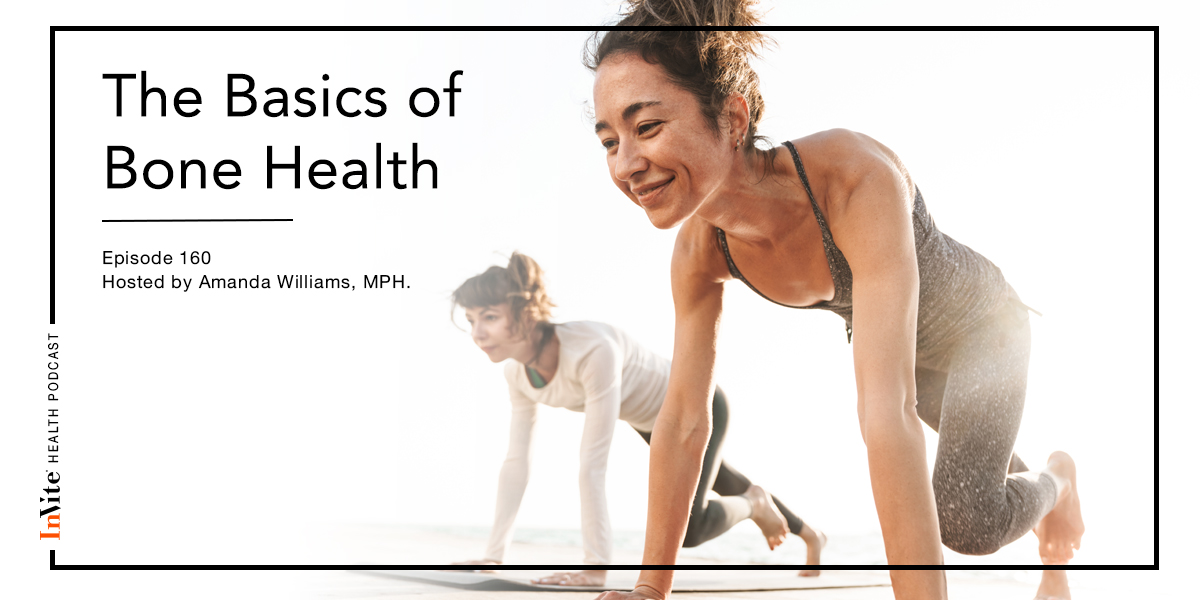The Basics of Bone Health – Invite Health Podcast, Episode 160

Invite Health Podcast, Episode hosted by Amanda Williams, MPH.
Subscribe Today!
When it comes to bone health, this is something that women should be the only one’s to focus in on! On today’s episode, I am going to discuss Osteoporosis and Osteopenia – what these conditions are and what you can be doing as you get older in order to maintain good bone mineral density. Let’s talk about all different and important aspects of bone health.
There are many factors that can impact bone loss throughout the years. Osteoporosis is considered to be a silent disease because people do not recognize that their bones are getting weaker. You may recognize if your muscles are feeling weaker, but not necessarily the strength of your bones. Most people do not even know that they have Osteoporosis until they actually break a bone. If you are not having regular bone mineral density tests performed (which is usually just done on post-menopausal females), then you may have no idea what the actual rate of bone loss is that you are experiencing. This is why over 10 million Americans have Osteoporosis and close to 50 million Americans have Osteopenia, or low bone mineral density.
Why Certain Individuals Have Bone Health Concerns
Women are oftentimes more prone to bone loss. This is because post-menopausal women have less estrogen, which is extremely important for maintaining bone strength and density. As estrogen levels start to decrease, this is when you start to see a weakening of the actual bones. The likelihood of a woman breaking a bone is far greater than the risk of a woman having a heart attack, a stroke or even breast cancer. So, this is a major issue that needs to be paid attention to. But men have to worry about supporting their bone health, as well. One in four men over the age of 50 will break a bone due to Osteoporosis – that’s 25% of men!
Eighty percent of older Americans who suffer from bone breaks are not tested for Osteoporosis when they suffer a bone break.
– Amanda Williams, MPH
Your diet matters when it comes to supporting bone health. If you are following the Standard American Diet and eating highly-processed, sugary foods, the likelihood of you getting comprehensive trace minerals and essential vitamins and minerals is extremely slim. These are needed to maintain bone remineralization and overall bone health. This is why, no matter your age, you must make adjustments to your diet and incorporate foods that are going to provide a wonderful source of these vitamins and minerals that are needed in the support of our bones as we age. A Mediterranean Diet is one I recommend on a daily basis, as it is the only diet that can provide you with the necessary nutrients and vitamins your body needs to work at its best. For more information on The Mediterranean Diet, click here!
Obesity also plays a major role in bone health concerns. Being obese is linked to having insulin resistance and hypertension. These factors can contribute to low bone mineral density. Increased age is definitely associated with bone loss. Family history also plays a major role in whether you will develop a condition that impacts your bone health. While healthy bones are influenced by nutrition and exercise, genetics also play a major role. In fact up to 85% of variation in peak bone mineral density can be explained by genetic factors. You may want to take a genetic test – a simple cheek swab – that can test your risk for developing bone conditions. For more information on the Bone Health Test, click here!
Other factors include:
- Cardiovascular disease
- Certain medications: SSRIs (anti-depressants), blood thinning medications and acid reflux medications
Incorporating Essential Bone Health Nutrients
It is extremely important that you start to incorporate the appropriate amounts of key vitamins and minerals that can support bone health overall. Here are my recommendations:
- Vitamin D: Get your serum Vitamin D levels tested regularly!
- Magnesium: You should aim for 350-400mg per day at baseline for women; for men about 400-450mg at baseline
- Calcium: you should aim for 500-1000mg of calcium in the evening
Questions for Amanda Williams, MPH about Bone Health or these essential nutrients? Leave a comment below to join the discussion!
Thank you for tuning in to the Invite Health Podcast. You can find all of our episodes for free wherever you listen to podcasts or by visiting www.invitehealth.com/podcast. Make sure you subscribe and leave us a review! Follow us on Facebook, Twitter and Instagram at Invite Health today. We’ll see you next time on another episode of the Invite Health Podcast.


